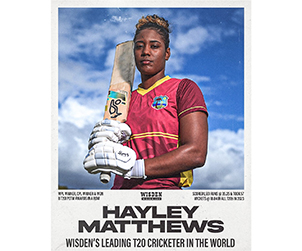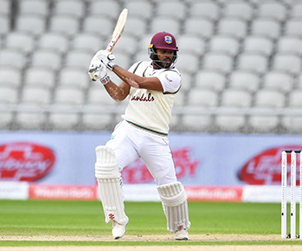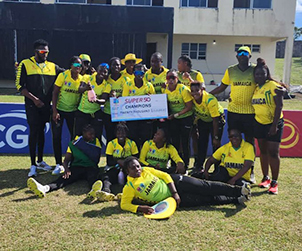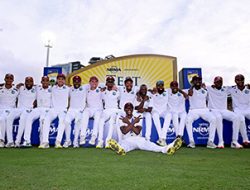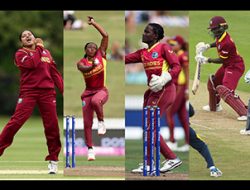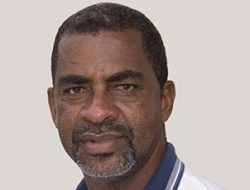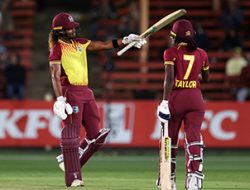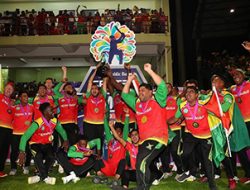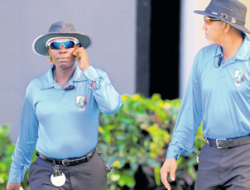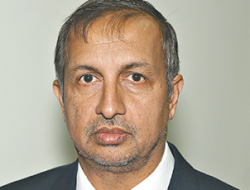Dave Cameron is by no means totally satisfied. But you can tell from his general demeanour that he’s growing more confident about the financial fortunes of West Indies cricket.
Based on Cameron’s mien, and against the background of the US$42-million squabble between the West Indies Cricket Board (WICB) and the Board of Control for Cricket in India (BCCI), it was inevitable that the Jamaica Observer would pose the question: Is the WICB solvent?
“Absolutely,” Cameron, the WICB president, answered without hesitation.
“The West Indies Cricket Board this year will turn a surplus, and I use the word very carefully, because it’s not profit, it’s a surplus in excess of US$2 million,” Cameron told last Thursday’s sitting of the Jamaica Observer Press Club.
“We currently have a deficit of about US$5 million, but our business model says that we will be able to continue to be in business and be able to wipe out that deficit within three years,” he added.
Cricket observers have insisted that the BCCI’s US$42 million compensation claim for the West Indies abandoning the Test and One-Day International series in India last year must be resolved for the WICB to move forward without problems.
Last Thursday, Cameron said he and WICB Chief Executive Michael Muirhead met with the hierarchy of the BCCI on October 17 in Mumbai and discussed playing matches in the future to deal with the claim.
“We hope to get a final resolution after the BCCI annual general meeting scheduled for November 9,” he said, adding that he was “very optimistic” about a resolution as the meeting was “very cordial”.
Asked to say what has given him confidence that the WICB will erase its deficit within three years, Cameron said: “A couple of things.”
The first, he explained, were the home series against India last year, England in May this year, followed by Australia in June.
“Our business model is always around playing those teams as much as possible, in addition to which we had a World Cup this year and we got a good payout from that, being the final event in the last rights cycle for the ICC (International Cricket Council),” he said, explaining that the ICC rights cycle runs for eight years.
That payout, he said, amounted to approximately US$17 million.
But the business model, Cameron said, involves more than securing revenue from home series.
Changes, he explained, have been made to the compensation structure for players as well as the domestic season schedule, which now starts in November as opposed to January in previous years.
“We complete our season by the end of March so that we can allow our best players who are in the cash-rich IPL (Indian Premier League) T20 to go off and make money, and they come back in time for the CPL (Caribbean Premier League),” Cameron said.
The IPL, which was founded by the BCCI in 2008, runs from April to May and is regarded as having the largest Twenty20 television audience worldwide. For instance, the first 45 matches in this year’s tournament reached 182 million unique viewers, according to a Business Standard online report posted on May 16.
This year’s tournament offered a total purse of US$6 million, with the winning team taking home US$3 million.
In 2014, the tournament’s brand value was estimated at US$7.2 billion.
The CPL was created in 2013, replacing the Caribbean Twenty20. Each of the six competing franchise teams has 15 contracted players, including a maximum of four cricketers from outside the Caribbean.
The league’s winning purse is US$250,000.
Cameron also pointed to the establishment of the Professional Cricket League (PCL) last year as one of the developments that, he said, will help improve the fortunes of the game in the region.
The PCL allows a total of 90 players across the six franchises to be contracted for a year wherein they are given access to consistent training.
“I think that is one of the biggest things we have done in West Indies cricket for the last 20 years,” Cameron said, adding that all the major cricketing nations across the world have a professional league for their players.
He said that prior to the CPL, the domestic season in the Caribbean consisted of five matches a year, which was “not enough if we intend to compete with the best teams in the world”.
He said that the average player from Sri Lanka, England, or South Africa, for instance, has a minimum of 50 first-class games under his belt by age 25.
“In our situation, it would be 25 [first-class games] at best, and so we keep putting in young players in the West Indies team, but they’re not developed. They’ve only played 10, 15, 20 first-class games,” Cameron argued.
“Now, with this new system, we guarantee you that within the next two years you’ll start to see the benefits of the professional set-up,” he declared.
Cameron also explained that the six franchises now have 15 full-time players on contract and still use players on a play-for-pay basis during the season, while another 15 players are contracted to the WICB.
“So now, there are 105 players contracted who are being paid monthly to play cricket. That only started last year,” he said.
Added to all that, he said, was the introduction of fiscal management, with the establishment of an internal audit Risk and Compliance Committee headed by Don Wehby,s who, Cameron said, “has been very vigilant”.
“We’ve tightened up our internal systems and practices as well, but in addition to that we’ve had some good fortunes of some good tours,” Cameron said.

